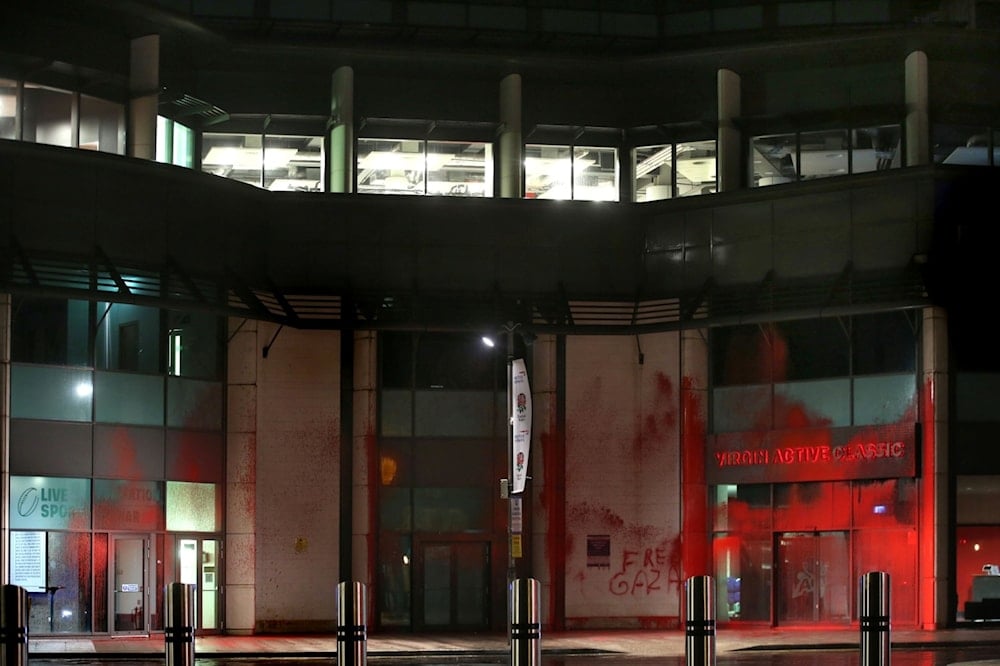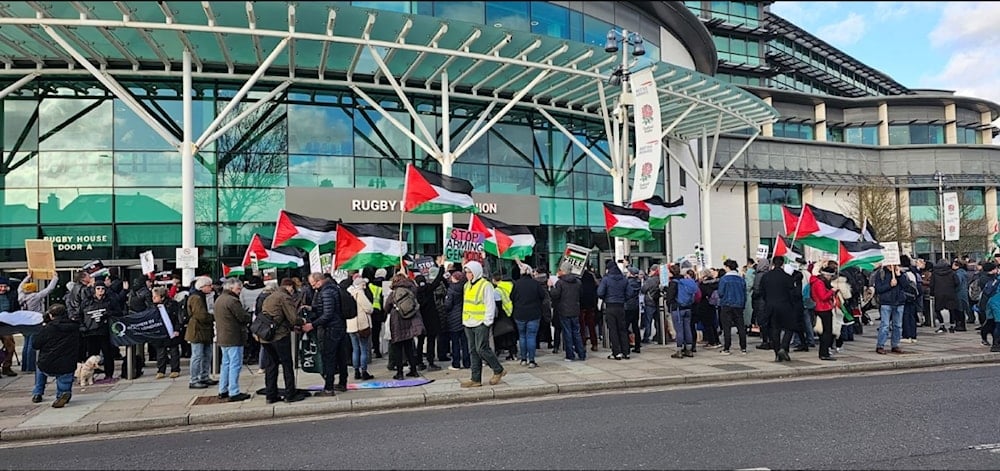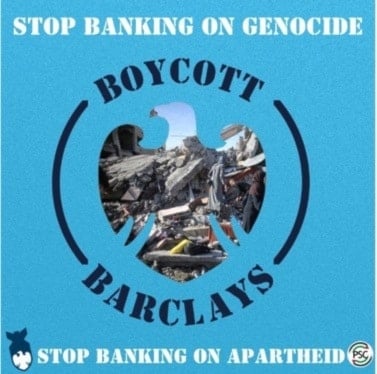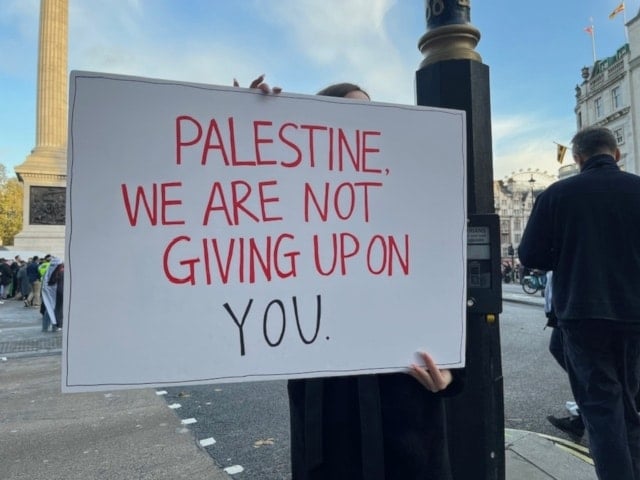British public protest Gaza genocide
The UK has witnessed multiple protests these past few days, all in different venues, in defense of Palestine, and in condemnation of the support for "Israel", both by the UK and companies and institutions therein.
-

70% of the British public wanted an immediate ceasefire, only 17%, or less than one in five, approved of the UK government’s handling of the conflict. (Al Mayadeen English; Illustrated by Arwa Makki)
A Storm at Twickenham
It was a mess. Monday morning in West London was grey, wet, and very windy. Residents woke to the aftermath of Storm Isha, which left two dead and thousands without power as 160 km/h winds battered Britain. Roads were littered with broken tree branches, highways operated with reduced speed limits and many trains were cancelled due to debris on the tracks.
In Twickenham, another storm was breaking. A suburban district of London, Twickenham sits directly under Heathrow Airport’s flight path. It’s a busy, noisy place with a population of 60,000. On its northern boundary sits a large grey stadium, which was built in 1909 and is home to English rugby. On game days the stadium holds 82,000 spectators; on non-game days its purpose-built 7,000 sqm exhibition stages a variety of large-scale events and smaller expos.
This Monday morning, Twickenham was hosting Defence IQ and their International Armoured Vehicles exhibition. An annual event, it attracts approximately 1,000 delegates from forty countries and is described as “an important cross-section to gather and address the question of how we will fight in the future?”. Participants include government and defence officials, and some of the world’s leading arms manufacturers - including Israel’s ELBIT Systems and Rafael.
The event is a morbid spectacle: clusters of men boastfully speaking of how to perfect mass murder using the latest technologies.
But some in Twickenham were not happy about the arms conference, and in particular the presence of ELBIT and Rafael, both of whom are actively supplying the Israeli Occupation Forces in Gaza.
At 1 am on Monday - under the cover of darkness - four people approached the main entrance. They slipped past the silver waist-high bollards and onto the main concourse. Rushing towards the entrance the group used paint-filled fire extinguishers to spray entrance doors red. The words “Free Gaza” were written on one wall. As the storm winds blew around them, the four disappeared into the darkness of the night. By 11.30 am Palestine Action, a UK-based direct action organisation tweeted they simply wanted “to give Israeli war criminals the welcome they deserve.”
By 3:00 pm, a crowd of a couple hundred, representing a cross-section of society, gathered outside the stadium. Some waved Palestinian flags, others held homemade placards. One read “Stop Arming Genocide.”
-

(Palestine Action)
70% of the British Public want a Ceasefire
For many, Monday’s protests at Twickenham were not a surprise. While the British government shamefully continues to be complicit in the genocide in Gaza, most of the British public are repulsed by it.
In late December 2023, polling organisation YouGov was commissioned by Medical Aid for Palestinians (MAP) and the Council for Arab-British Understanding (Caabu) to assess public opinion on "Israel’s" attack on Gaza. The results were clear: 70% of the British public wanted an immediate ceasefire, only 17%, or less than one in five, approved of the UK government’s handling of the conflict. For the opposition party, it was even worse: a measly 9%, or one in every ten people, approved of their response to the conflict.
Chris Doyle, Director of Caabu, said: “This poll shows a total and utter lack of public confidence in the way both the UK government and the [opposition] Labour Party have handled this. The figures could hardly be lower. This should be a wake-up call to political leadership to realign themselves both with public sentiment, international law, and the need to address the catastrophic humanitarian situation in Gaza.”
The poll wasn’t the only indicator of the British public’s frustration. In the three days leading up to the Twickenham protests, there were a series of actions calling for an immediate ceasefire and an end to the genocide.
-

(Palestine Solidarity Campaign)
Sunday January 21: A Silent Walk for Peace
The Quaker Movement, sometimes referred to as The Religious Society of Friends, was founded in northwest England by George Fox in the 17th century. Quakers believe the presence of God exists in every person and practice a simple form of spirituality, devoid of elaborate ceremonies and an official clergy order. They also embrace universal pacifism, rejecting all forms of violence, including genocide.
At noon on Sunday, the Quakers, along with Plum Village UK, a Buddhist community, and Together for Humanity, a coalition of charities and community organisations, walked in silence from London’s Trafalgar Square to Parliament Square. Several thousand quietly moved through the capital’s streets without flags or placards, there were no slogans or chants. Instead, they carried hand-made white flowers, a purposeful symbol of the more peaceful world we all deserve.
At the end of the walking vigil, Rowena Loverance, Quaker and chair of Churches Together in England, reminded everyone “of the bonds that unite the whole human family."
Saturday January 20: Churchill Shopping Centre
Churchill Square is the main shopping centre in the seaside town of Brighton, some 75 miles south of London. It is modern: three floors, 80 shops, one large food court, and a collection of open-air stalls along its corridors. It’s a place you go to relax, to lose yourself and for a few hours forget your problems.
On Saturday afternoon, it became a window to the genocide being inflicted on Gaza. During the morning, 150 artists, activists, and protesters arrived at the shopping centre in small groups. Some were carrying large bags, others carried boxes. They positioned themselves at strategic points: next to railings, at the bottom of escalators, and in the lobby area. When the signal was given, a large Palestinian flag was unfurled, draping down two storeys. Dozens of smaller flags were stuck to rails, and hundreds of leaflets were dropped from balconies. Others chanted “While you're shopping, bombs are dropping” and “Stop killing children.”
Then they were silent. Twelve activists dressed as judges walked into the shopping centre atrium and read aloud Blinne Ní Ghrálaigh’s International Court of Justice (ICJ) speech, which accuses "Israel" of genocide. For a brief moment, time stopped - and shoppers felt the assault Palestinians have been experiencing since October 7th, 2023.
One of the day’s organisers, Artist Action’s Tanushka Marah, explained why she felt compelled to act in defence of Palestinians: “As artists and above all, as fellow human beings, we cannot stand by and do nothing while hundreds of innocent people are slaughtered daily. We are here today to bring home to shoppers and passers-by the crimes against humanity taking place on an unimaginable scale in Gaza and the Occupied West Bank. We support the case being brought before the ICJ and call on all our political representatives to urge the Israeli government to stop the killing now.”
Saturday January 20: Stop Funding Genocide
Genocide is expensive. At the end of December 2023, The Washington Post claimed "Israel’s" GDP growth was set to drop from 3% to 1% due to its ongoing assault on Gaza. Further analysis by the news outlet estimated military operations in Gaza had cost "Israel" about $18 billion — or $220 million a day thus far.
Reuters speculated another $14 billion of funding will be needed for the first two months of 2024 alone. The web of funds and financiers of the Gazan genocide is as wide as it is complex, but one institution continues to be called out: Barclays Bank.
Barclays is old money. It was established in 1690 in the city of London, where it has maintained its headquarters ever since. The bank is famous for deploying the world's first cash dispenser in 1967, and infamous for its close ties with apartheid states – first South Africa, and now "Israel".
Research from the Palestine Solidarity Campaign shows the bank “holds over £1 billion in shares and provides over £3 billion in loans and underwriting to nine companies whose weapons, components, and military technology are being used by Israel in its attacks on Palestinians.”
Through these investments, Barclays is knowingly funding weaponry that is being used in the genocide of the Palestinian people.
On Saturday morning, around 20 protesters gathered outside Barclays' branch in Cambridge, a university town approximately 70 miles north of London. The group was a coalition made up of Cambridge Palestine Solidarity Campaign, Cambridge Stop the War, and Cambridge University PalSoc. The group stood by the bank entrance chanting "Free Palestine,” waving Palestinian flags, and handing out leaflets detailing Barclays' support of "Israel’s" apartheid regime. Others made their way into the bank and staged a sit-in. The bank closed at 11:30 am and did not re-open.
Similar protests and sit-ins were held in Barclays branches in Birmingham, Canterbury, Carlisle, Dorchester, Hitchin, Ipswich, London (Bromley, Enfield, Hackney, Haringey), Oxford, and Stevenage, where chants included “Barclays Bank, you can’t hide - You’re supporting genocide,” “Barclays Israel USA - How many kids did you kill today?” and “Barclays Bank, shame on you - You’re supporting war crimes too.”
-

(PSC)
Friday January 19: Blood on Your Hands
The School of Oriental and African Studies (SOAS) is an interesting institution. It is in central London's elite Bloomsbury district and views itself as an alternative to the more established universities in England. It received its royal charter in 1916 and admitted its first students in 1917. The colonialist Earl Curzon of Kedleston, Viceroy of India between 1899 and 1905, was a notable attendee at its inauguration.
Today, SOAS proclaims itself an intellectual champion of the Global South, and a quality learning environment with an unparalleled post-imperial, post-colonial curriculum and pedagogy. Yet its roots are worryingly colonial. Its wiki page confirms its founding mission was to train “British administrators, colonial officials, and spies for overseas postings across the British Empire.”
Has the institution birthed by colonialists truly liberated itself? The answer appears to be not yet. SOAS has suppressed Palestinian solidarity, undermined workers’ rights, violated the 2010 Equality Act, and established a working relationship with Haifa University, contrary to the 2004 Palestinian Campaign for the Academic and Cultural Boycott of Israel (PACBI).
On Friday, the Head of the Palestinian Mission to the UK, Husam Said Zomlot, was invited to speak at the SOAS campus. While being escorted out of the building, he was confronted by members of SOAS’ Palestinian Society, who alleged the Palestinian Authority (PA) whom the senior diplomat represents, is complicit in Zionist aggression in Palestine.
As Zomlot moved away from the protestors one student shouted: “You have blood on your hands! You’re a PA collaborator… Shame on you!”
Zomlot and his entourage look back awkwardly. Startled they climb the stairs towards the exit. The student continued: “Blood on your hands collaborator. You are not welcome here. You are not welcome to our campus.”
Since October 7, the PA’s popularity amongst Palestinians has been on a continual decline. Large numbers of Palestinians are calling for its president, Mahmoud Abbas to resign and for the PA to take a more confrontational approach toward "Israel". Those calls are now also coming from students at SOAS, who understand how hard decolonising really is.

 Sul Nowroz
Sul Nowroz
 11 Min Read
11 Min Read












